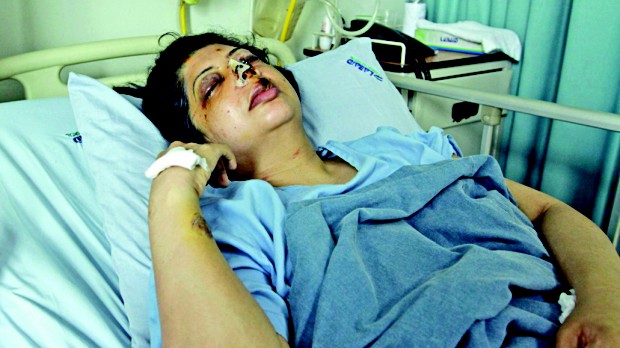| Home - Back Issues - The Team - Contact Us |
 |
| Volume 10 |Issue 24 | June 24, 2011 | |
|
|
Perspective Enough ANIKA HOSSAIN When we hear about cases of domestic violence or any violent relationship for that matter, the first thought that comes to mind is- how can one stay in such a relationship and put up with it? If it were me, I would have left ages ago. What we don't realise is, it isn't that easy to just pick up and leave. Not when your loved ones are involved. Domestic violence is very common in Bangladesh. In rural areas, it has become a part of everyday life. But once in a while, a case will appear in the papers about one of our own, from an upper middle class family, perhaps living right next door, reminding us that there is much more to this issue than just ignorance and illiteracy- it can happen to anyone. There are numerous reasons why one partner (mostly the male partner in our country) becomes violent. The wife's inability to pay her dowry, to produce a male child, or the simple need of the man to exercise control are primary reasons this happens in rural areas. For someone from an educated, well-to-do background, the reasons may be different.
In Hasan Sayeed Sumon's case that reason was insecurity. He suffers from poor vision and has to wear thick glasses. His vision held him back from many achievements, both educational and professional, while his beautiful, successful wife, Rumana Manzur, was on her way to achieve all she had ever dreamt of. In the end, he just couldn't take being outshined by her. He took from her, the one thing he knew he would never have- her perfect eyesight. Many have analysed the psychology behind these acts of violence. And while we all agree that the abusers need to face consequences for their actions, what is more important is for the victims of these heinous crimes to get assistance before the violence escalates to a level that causes irreparable damage to their lives. While the obvious solution is to end the marriage and leave, it is not that easy to accomplish. One has to be in a situation like this to actually understand it. A typical abusive relationship follows a cycle. The cycle begins as tension builds because of various different issues, these can be very trivial at times. When the tension reaches a breaking point, the abusive partner vents his frustration by committing acts of violence against his spouse. He then blames the victim for having caused the violence in the first place, making her feel shame and guilt. He then shows remorse and makes promises to change- until the next time something bothers him and the cycle is repeated. Over and over again. This repetition of violence results in the victims blaming themselves for not being able to prevent it. It leaves them vulnerable and helpless, a condition, which psychologists refer to as “learned helplessness.” They develop symptoms of clinical depression and passivity, causing them to become emotionally dependent on their abusers, making it difficult for them to leave.
For some women, who have grown up in violent households, witnessing abuse between parents and being victimised early in life, this is not something out of the ordinary. They may delude themselves into believing that violence is an expression of love. Some are financially dependent on their husbands and do not have anywhere else to go. Some stay for the sake of their children, worrying that they will be not allowed to see their little ones again if they leave. Some worry about the stigma of a divorce and the difficulties of having to start their lives afresh, all alone-especially in a society like ours where divorced women are often ostracised. Some worry that their abusive partners will find them wherever they go- these women are mostly the ones who constantly face death threats. Some are so insecure, they believe they have brought this abuse on themselves and will continue to do so no matter who they are with. One of the main reasons a battered woman will stay, is because of a misguided sense of love and loyalty they feel for their abusers, so that every time he plays nice, she is compelled to believe he will change some day. Regardless of what the reason is, when the torture becomes unbearable and they see a real threat to their lives, at some point or the other, every victim wants to get out. What we as a society can do for them, is give them the means to do so. It is very important to have resources available for victims of domestic abuse, and make them aware of their existence. There are a number of safe houses and shelters all over the city, for victims of domestic violence. There are NGOs and women's' rights organisations, which have programmes for the protection and rehabilitation of the victims, some examples being the BNWLA, Ain O Shalish Kendra and Rokeya Shadan. Domestic violence hotlines need to be set up and task forces developed by law enforcement agencies, to provide victims with immediate assistance whenever it is required. Currently there is one trauma centre, which provides counseling for these victims, which is insufficient to meet the needs of people all over the country. Counseling is crucial for a victim of domestic violence and when provided at the correct time, can be effective in preventing the victim from returning to her abusive partner. Victims also need to be made aware of the laws against domestic violence, and the steps they can take to gain custody of their children and sever all ties with their abuser. We as a society can also learn to be more accepting of women who want to get out of an unhappy marriage, no matter what her reasons may be. In some social circles, especially among the upper classes, the evidence of violence is not apparent, but we have seen through Rumana Manzur's case that it does exist. It is just masked by a facade of normalcy. If we support these women, tell them its okay to leave, we may be saving them from a fate like Rumana's, or much worse. As for Hasan Sayeed Sumon, the courts need to come up with an exemplary punishment for him so that no one thinks they can commit such atrocious crimes, just because they can get away with it.
Copyright
(R) thedailystar.net 2011 |

